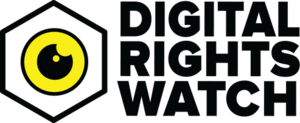Digital Rights Watch
Topic: Organization
 From HandWiki - Reading time: 4 min
From HandWiki - Reading time: 4 min
 | |
| Formation | 2016 |
|---|---|
| Founded at | Melbourne, Australia |
| Type | NGO |
| Legal status | Charity |
| Purpose | Digital Rights |
| Website | digitalrightswatch |
| Director: Lucie Krahulcova Chair: Elizabeth O'Shea | |
Digital Rights Watch is an Australian charity organisation founded in 2016[1] that aims to educate and uphold the digital rights of Australian citizens.
History
In 2016, largely in response to the introduction of Australia's mandatory metadata retention scheme, Digital Rights Watch was created at a meeting of representatives from Australian human rights organisations, activists, political advisers, technology consultants and academics. To coordinate a civil society response to the metadata retention scheme as well as other key digital rights violations, a new organisation was founded with the aim of aligning and supporting existing efforts.
Focus
Digital Rights Watch's mission is to ensure that Australian citizens are equipped, empowered and enabled to uphold their digital rights. The organisation works on advocacy, policy reform and public-facing campaigns that push for ethical data use by corporations,[2][3][4] good digital government practices and policies,[5][6] a rights-based legal system, and empowered and informed citizens.
Structure
Digital Rights Watch is an incorporated Association, registered as a national charity with the Australian Charities and Not-For-Profits Commission. It is a member-run organisation, with a board of directors elected once a year at its Annual General Meeting. The organisation also operates an Advisory Council, which informs and advises on policy and strategy.
Digital Rights Watch is a member of the CIVICUS World Alliance for Citizen Participation, the Australian Digital Inclusion Alliance,[7] and the global Keep It On campaign.[8] In October 2017, Digital Rights Watch's Chair Tim Singleton Norton received a special mention in the Access Now Global Heroes and Villains of Human Rights Awards.
Digital Rights Watch often works in partnerships with other Australian digital or human rights organisations such as the Human Rights Law Centre, Amnesty International Australia, Electronic Frontiers Australia, the Australian Privacy Foundation, ACFID and others. Digital Rights Watch also works with international groups such as Access Now, Electronic Frontiers Foundation, Open Media, EDRi, Privacy International and others.
Campaigns
In August 2016, Digital Rights Watch coordinated a campaign, including media coverage,[9][10] expressing concern over privacy issues raised in the Australian national census.
On 13 April 2017, Digital Rights Watch declared a national day of action against mandatory data retention,[11] calling for all Australians to 'Get a VPN'.[12]
In August 2017, Digital Rights Watch hosted an event as part of the Melbourne Writers Festival in which they profiled the personal metadata footprint of Professor Gillian Triggs, former President of the Australian Human Rights Commission.[13]
In September 2017, Digital Rights Watch partnered with Privacy International to push for greater transparency over intelligence sharing operations between governments.
In May 2018, Digital Rights Watch launched the State of Digital Rights report, outlining several ways that Australian citizen's digital rights are being eroded.[14]
Between October and December 2018, Digital Rights Watch coordinated a public campaign The Alliance for a Safe and Secure Internet against proposed legislation that gave increased powers to law enforcement to break encryption protocols.[15][16][17][18][19]
In May 2019, Digital Rights Watch partnered with Electronic Frontiers Australia to launch the Save Australian Technology[yes|permanent dead link|dead link}}] campaign.
References
- ↑ "Digital Rights Watch group launches to fight for "free and open Internet"". Delimiter. 16 March 2016. https://delimiter.com.au/2016/03/16/digital-rights-watch-group-launches-fight-free-open-internet/.
- ↑ Burns, y; Morris, Madeleine (2018-11-22). "Political parties may know a lot more about you than you think" (in en-AU). https://www.abc.net.au/news/2018-11-22/political-parties-know-a-lot-more-about-you-than-you-might-think/10511590.
- ↑ "It isn't just greedy corporations using and abusing your private data". 2018-03-28. https://www.crikey.com.au/2018/03/28/it-isnt-just-greedy-corporations-using-and-abusing-your-private-data/.
- ↑ O'Shea, Lizzie (2018-04-25). "Tech has no moral code. It is everyone’s job now to fight for one | Lizzie O’Shea" (in en-GB). The Guardian. ISSN 0261-3077. https://www.theguardian.com/commentisfree/2018/apr/25/tech-no-moral-code-racist-ads-cambridge-analytica-technology-ethical-deficit.
- ↑ Lizzie O’Shea, Justin Warren (2018-07-28). "The positives and perils of My Health Record". https://www.thesaturdaypaper.com.au/news/politics/2018/07/28/the-positives-and-perils-my-health-record/15327000006624.
- ↑ "There are no easy fixes for the live streaming of real-life hate" (in en). 2019-03-19. https://www.afr.com/news/economy/there-are-no-easy-fixes-for-the-live-streaming-of-real-hate-20190319-h1cjp9.
- ↑ "Australian Digital Inclusion Alliance" (in en). https://digitalinclusion.org.au/.
- ↑ "#KeepItOn" (in en-US). Access Now. https://www.accessnow.org/keepiton/.
- ↑ Norton, Tim Singleton (2016-08-05). "The census is too important to boycott, despite serious privacy concerns" (in en-US). The Sydney Morning Herald. https://www.smh.com.au/comment/the-census-is-too-important-to-boycott-despite-privacy-concerns-20160804-gqllvs.html.
- ↑ Berg, Chris (2016-03-15). "If you're worried about privacy, you should worry about the 2016 census" (in en-AU). https://www.abc.net.au/news/2016-03-15/berg-census-privacy-threat/7244744.
- ↑ "Get a VPN" (in en-AU). 2017-04-11. https://digitalrightswatch.org.au/2017/04/12/get-a-vpn/.
- ↑ "'Get a VPN' as metadata retention scheme deadline arrives, experts say" (in en-AU). ABC News. 2017-04-13. https://www.abc.net.au/news/2017-04-13/metadata-retention-scheme-deadline-arrives/8443168.
- ↑ "Gillian Triggs Let Someone Have A Day's Worth Of Her Metadata To Show Why She Believes In Warrants" (in en). BuzzFeed. https://www.buzzfeed.com/joshtaylor/gillian-triggs-let-someone-have-a-days-worth-of-her.
- ↑ "Data leaks a breach of Australian's human rights, report says" (in en-AU). ABC News. 2018-05-14. https://www.abc.net.au/radionational/programs/breakfast/data-breach-human-rights-report/9757610.
- ↑ thejuicemedia (2018-09-02), Honest Government Ad | Anti Encryption Law, https://www.youtube.com/watch?v=eW-OMR-iWOE, retrieved 2019-05-15
- ↑ "Turnbull's attacks on encryption will enable crime at the cost of our rights". 2018-06-27. https://www.crikey.com.au/2018/06/27/government-attacks-on-encryption-will-have-huge-impacts-on-the-way-we-live/.
- ↑ "The internet holds society together and the government is setting out to break it" (in en-US). 2018-08-24. https://rightnow.org.au/opinion-3/the-internet-holds-society-together-and-the-government-is-setting-out-to-break-it/.
- ↑ Norton, Tim Singleton. "Sleepwalking into a digital dystopia" (in en-US). https://overland.org.au/2018/09/sleepwalking-into-a-digital-dystopia/.
- ↑ Norton, Tim Singleton (2018-12-09). "One giant step backwards for cyber security in encryption bill fiasco" (in en). https://www.theage.com.au/politics/federal/one-giant-step-backwards-for-cyber-security-in-encryption-bill-fiasco-20181209-p50l5a.html.
External links
 |
 KSF
KSF